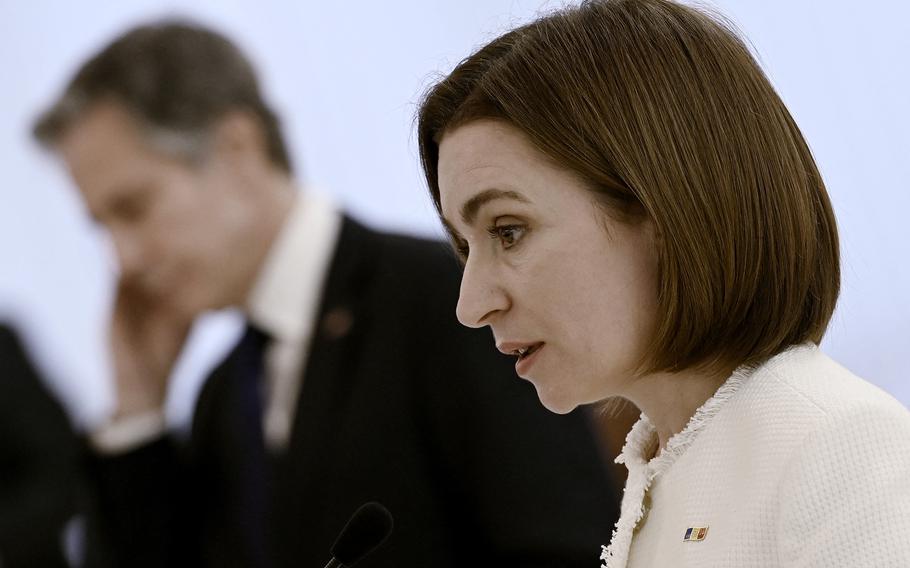
Moldova President Maia Sandu, right, speaks next to U.S. Secretary of State Antony Blinken during a news conference at The Presidential Palace in Chisinau, on March 6, 2022. A razor-thin majority of Moldovans has voted in favor of eventually joining the European Union. (Olivier Douliery, Pool Photo, AFP via Getty Images/TNS)
A razor-thin majority of Moldovans voted in favor of eventually joining the European Union, preliminary results showed Monday, after President Maia Sandu said the referendum had been marred by “unprecedented” pro-Russian interference.
On Sunday, Moldova held a crucial twin vote: one to elect a new president and the other to determine whether the country would eventually choose European Union membership.
For Sandu, a pro-E.U. candidate elected on anti-corruption promises, the vote was a culmination of her four-year-long presidency in this small former Soviet country situated between Romania and Ukraine that has been locked in a decades-long battle over its political direction, torn between Moscow and the West.
Yet the knife-edge result is far from a confident endorsement of her attempts to push the country sharply toward the West. After 99.41% of the 1.4 million votes were counted in the referendum, 50.39% voted in favor to 49.61% who voted against, according to the Central Electoral Commission.
The country’s aspiration to join the bloc will now be enshrined in the constitution, so it will be significantly harder to back away from this path should a more Russia-friendly leader come to power.
“The people of Moldova have spoken: our EU future will now be anchored in the constitution. We fought fairly in an unfair fight — and we won,” Sandu said on X. “But the fight isn’t over. We will keep pushing for peace, prosperity, and the freedom to build our own future.”
For the presidential election, Sandu won 42% of the votes, while her primary opponent, former prosecutor-general Alexandr Stoianoglo, took 26% in a field of 11 candidates. They will face each other in a runoff Nov. 3.
The full-scale invasion of Ukraine cast a shadow over Moldova’s future, prompting many pro-E.U. politicians to fear their country might be next. Russia keeps a small contingent of troops in Moldova’s breakaway region of Transnistria.
In an early Monday tweet, Sandu said that “criminal groups, working with foreign forces,” had attempted to influence Moldovan elections using “tens of millions of euros, lies, and propaganda.”
“We have clear evidence that these criminal groups aimed to buy 300,000 votes a fraud of unprecedented scale,” she added. “Their objective was to undermine a democratic process. Their intention is to spread fear and panic in the society.”
Moldovan authorities accused Moscow of stepping up its “hybrid war” campaign to derail Moldova’s E.U. path and sway the elections in Russia’s favor. The allegations include funding pro-Moscow opposition groups, spreading disinformation, interference in local elections and backing a major vote-buying scheme.
One such scheme was orchestrated by fugitive Moldovan oligarch Ilan Shor, who authorities say ran a major operation to buy votes by offering money to pensioners if they voted against the referendum.
The Washington Post previously reported how the 37-year-old Shor emerged as a key figure in the Kremlin’s efforts to subvert the former Soviet republic, as Moscow funneled millions of dollars to build a network of friendly politicians and pull Moldova back into its orbit.
In 2022, the U.S. Treasury imposed sanctions on Shor, saying he had been “coordinating with representatives of other oligarchs to create political unrest in Moldova” and had “received Russian support” and worked to undermine Moldova’s bid to join the European Union.
E.U. officials in Brussels have also underscored Russian interference in Moldova and stressed its continued support for Moldova to one day join the bloc.
President of the European Commission Ursula von der Leyen congratulated Sandu on the results of the referendum, saying: “You’ve done it again! In the face of Russia’s hybrid tactics, Moldova shows that it is independent, it is strong and it wants a European future!”
Peter Stano, spokesman for the E.U. external affairs, said Monday the “vote took place under unprecedented interference and intimidation by Russia and its proxies, aiming to destabilize the democratic processes in the Republic of Moldova.”
Stano told reporters that allegations of vote buying, the busing of voters and disinformation are only the most recent forms of Russian interference, and that attempts to undermine Moldova’s support for the E.U. have been going on much longer.
Top Russian officials sought to cast doubt on the legitimacy of the procedure, with Kremlin spokesman Dmitry Peskov calling the election campaign “unfree.”
“The first thing that we see is, of course, such mechanical, hard-to-explain surges in the number of votes for Sandu and referendum participants supporting the integration in the E.U.,” Peskov said in a call with reporters Monday.
“Even amid this unfree election campaign, we see how many people oppose the ideology of incumbent President Sandu,” he added.
Russian state TV echoed the Kremlin’s talking points by claiming the election was riddled with “massive fraud,” with one top anchor calling the vote “the most scandalous in history.”